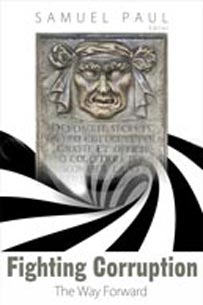 A4
A4

Hard-cover
•
2014
Pages: 298
ISBN: 9789332700116
INR 995

More people today are ready to fight corruption in India’s public life than ever before. Very few, however, know what it takes to achieve corruption free governance. The causes and manifestations of corruption are multiple and complex. In the final analysis, it is actions by the state, its institutions and civil society that are critical to achieving corruption control. We need both preventive and punitive measures to successfully fight corruption.
This book examines the phenomenon of corruption from multiple perspectives and proposes an agenda of reform that has the potential to achieve corruption control. The contributors to this volume believe that without a major reform of India’s rather opaque and dysfunctional governance system, corruption free governance will remain a mere dream. Reform of the financing of political parties and elections, ways to minimise conflicts of interest and the capture of policymaking and regulatory regimes, redesign of service delivery systems, the scaling up of e-Governance to enhance transparency and accountability, and support to several important reforms already under way in government, are the way forward to effectively bring corruption under control.
This book, edited by Samuel Paul, provides a most comprehen-sive and in-depth survey of the rising tide of corruption in India and what needs to be done to tackle it. The subject of corruption is, of course, of great contemporary importance for the function-ing of our polity and governance. What distinguishes this book is its practical and multi-pronged approach for finding solutions to the problem. It deserves to be read by all concerned, particularly our parliamentarians and policy makers.
— Bimal Jalan
Former Governor, Reserve Bank of India, and former MP
The euphoria of the anti-corruption movement is waning. Factionalism and cynicism have made inroads, undermining most of what was gained. But the huge and complex issue of corruption remains, confronting us every day. Here is a cogent and thoughtful analysis of this hydra headed monster, and the levels at which it can be fought and slain. Individuals, groups, politicians, bureaucrats, intellectuals, and law makers, all have a role to play. And play it, we must.
— Mallika Sarabhai
Social commentator and activist
Samuel Paul, a former Professor and Director, Indian Institute of Management (IIM), Ahmedabad, is the founder and first chairman of the Public Affairs Centre (PAC), Bangalore, that pioneered the use of ‘citizen report cards’, a tool for social accountability. He has served as an adviser to the United Nations, World Bank and the ILO. His latest book (co-author) is The State of Our Cities (OUP, 2012).
R. Balasubramaniam
G.C. Bharuka
Subhash Bhatnagar
Bibek Debroy
Madhav Godbole
Samuel Paul
V. Ranganathan
E. Sridharan
A. Vaidyanathan